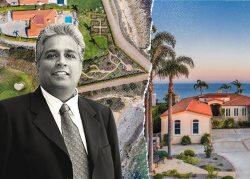A new lawsuit alleges that a local development moratorium to protect against landslide risk is really a “takings” claim, adding another layer to California’s broad war over development and local control.
The suit comes from a property owner in Portuguese Bend, a largely undeveloped section of the Palos Verdes Peninsula with a 400-acre nature preserve, jagged canyons and postcard-worthy beaches.
Since the City of Rancho Palos Verdes imposed a moratorium because of the area’s landslide risk, property owners have feuded with the city over the issue on and off for decades, leading to one of California’s longest-running local development battles and a major environmental real estate test case involving “takings,” which refers to a government’s overreach in putting restrictions on private property to the extent that it effectively takes the property from the owners.
“The city has engaged in a permanent taking on [the owner’s] property,” the suit alleges. “The city has taken the position that its local ordinance trumps California state statutes in violation of the general preemption principles of law.”
The suit was filed in L.A. County court last month on behalf of Limetree Estates, the entity that owns the land. Limetree acquired the property relatively recently, in November 2020, for $34,000, according to property records. The seller was a family trust that had held the parcel since the early 1990s. It was unclear who was behind Limetree Estates, or if the same family was still involved.
Neither the lawyer representing the plaintiffs nor the Rancho Palos Verdes city attorney responded to questions from The Real Deal.
The new litigation comes after decades of legal animosity in Portuguese Bend, a rugged area known for its riding and hiking trails that’s also highly desirable for residential real estate. Currently, one 2,900-square-foot home is on the market for $2.8 million; another vacant half-acre lot close to the water is listed at $5 million.
The saga dates back to the 1950s, when a road crew “accidentally reactivated a subsurface prehistoric slide area,” in the words of one court summary. That disturbance disrupted almost a square mile of hillside land, causing it to move slowly downhill. In the 1970s, after another slide, the newly incorporated City of Rancho Palos Verdes instituted a strict moratorium on local development, freezing the area’s homes in place.
But some property owners objected, arguing the moratorium amounted to takings. In 2008, a group of property owners won a decision that allowed a kind of carve-out to the moratorium; another group of residents, fearing a construction boom that would spoil the area and potentially cause new slides, then sued to make it more difficult to build.
“A lot of us are frightened and upset over this,” one resident who opposed new construction told the L.A. Times in 2009. “We’re living with a bomb over our heads.”
The latest suit involves a rectangular lot that’s about half an acre and vacant.
But it’s not totally vacant: Limetree alleges that, because of the shifting landscape, a private road, known as Tangerine Road, has actually moved so that it’s now bisecting the Limetree-owned vacant lot. The development moratorium — which does apply to the property — means that local owners are unable to do anything about it.
“The city could also simply allow improvement owners in the region to move their improvements back to their points of [origin],” the suit says. “In the case of roads, this would simply be to demolish and repave the roads.”
But the city refuses to do so or to fix the situation itself, the suit alleges, which amounts to a takings against Limetree. The suit also cites a California statute that allows citizens to remove public nuisances from their property. But in refusing to allow any demolition permits, Rancho Palos Verdes is wrongly overriding state law, the suit claims.
The suit seeks a court determination of both a temporary and permanent taking and damages, although it does not specify how much.
Read more



